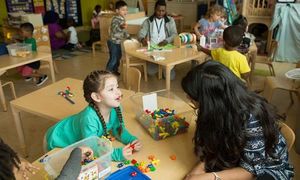Ramadan, the holy month for Muslims, has arrived once again, with its significance echoed throughout Bangladesh. The moon signaling the start of Ramadan for the Hijri year 1446 was sighted on Saturday evening, leading to the commencement of the fasting month from Sunday, March 2. This month is not only marked by abstaining from food and drink from dawn until sunset but also emphasizes prayer, reflection, and community.
Following the evening prayer (Isha), devout Muslims gathered for the Tarawih prayers, which are extra prayers performed at night during Ramadan. Islamic practices dictate the importance of engaging deeply during this time, with many taking the initiative to read and reflect upon the Quran, which is celebrated as having been revealed during this sacred month. Dr. A. F. M. Khalid Hossain, the advisor to the Ministry of Religious Affairs, underscored the essence of Ramadan during discussions held at the central mosque of Bangladesh Bank. He emphasized, "The goal of fasting is to cultivate purity of life. We need to build purer lives through the practice of fasting."
Throughout the month, Muslims partake in various important practices, starting with 'Sehri,' the pre-dawn meal before fasting begins, followed by 'Iftar,' the meal to break the fast at sunset. The timings for these meals are strictly adhered to, with the Islamic Foundation releasing the timetable for Sehri and Iftar times across Bangladesh. For example, on March 2nd, the last time for Sehri was 5:03 AM, and Iftar was scheduled for 6:03 PM. These times are shared widely to assist communities as they navigate the day-to-day observance of fasting.
One of the most highlighted aspects during this time is the emphasis on charity and helping those less fortunate. The month is marked by increased generosity, particularly through giving 'Zakat' and voluntary charity (Sadaqah). Dr. Khalid noted the significance of mitigating unethical practices and fostering goodwill within the community, stating, "The practice of Ramadan should guide us away from falsehood, deceit, and corruption." He reminded attendees of the essence of charity during Ramadan, referencing the teachings of the Prophet Muhammad, who was known for his generosity, particularly during this month. The Prophet's acts of charity were said to increase drastically during Ramadan, likened to the flowing of the wind, which emphasizes the abundant giving expected from Muslims during this period.
Communities across Bangladesh come together during Ramadan, often organizing communal Iftars where individuals, regardless of their fasting status, can share meals. This camaraderie reinforces the sense of connection and unity among people, making the atmosphere joyful and collaborative.
Many people also participate actively by scheduling their days around the fasting periods, ensuring they nourish their bodies appropriately during the limited hours. This is often complemented by discussions around the health benefits of fasting, which is said to include increased immunity, improved mental clarity, and even weight loss when combined with discipline during meals.
Muslims take the opportunity to repent and seek forgiveness during this month, leading to personal reflections and improvements within their lives. Observers state this month serves as a time for self-discipline and character building, as participants strive to cultivate good habits and curtail negative behaviors. Guidelines from religious leaders suggest focusing on acts of kindness and striving for self-improvement as ways to fully benefit from the spirit of Ramadan.
The community's commitment to charitable actions during Ramadan cannot be overstated. Various organizations initiate larger-scale charitable projects, distribute food to the needy, and conduct drives to support those who are less financially stable during this month. For example, it has been reported from several mosques and organizations around Bangladesh, there are efforts to distribute food packages to impoverished families, ensuring everyone has access to nutritious meals for Iftar.
Also, discussions have arisen about how to prevent price gouging and availability issues during Ramadan, as increased demand for food can sometimes outpace supply, leading to heightening concerns over economic stability during the month. Dr. Khalid called for business owners to maintain reasonable prices, emphasizing the value of community over profit.
To conclude, Ramadan is not only about fasting. It embodies renewal—spiritually, physically, and socially—as communities reinforce their ties and commitments to righteousness and charity. It’s seen as both a trial and celebration, with each individual invited to immerse themselves fully for growth, enhancement of character, and enriching community bonds.



